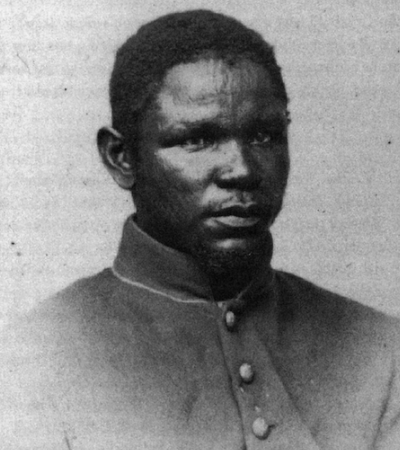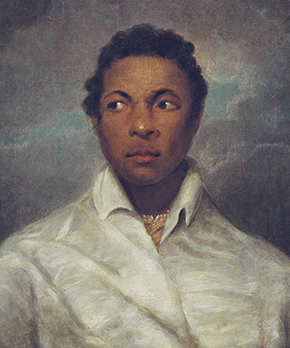 Jessie Dunbar, Ph.D., assistant professor of English, writes about those whose experiences in Russia helped lay the foundation for communism’s early appeal among black Americans in her forthcoming book.In the mid-19th century, when the United States was still deeply involved in the slave trade, Russia was becoming a safer destination for black emigrants. Black writers such as Nancy Prince and Nicholas Said and black actor Ira Aldridge, who were vocal about their experiences there, helped lay the foundation for communism’s early appeal among black Americans, said Jessie Dunbar, Ph.D., assistant professor of English.
Jessie Dunbar, Ph.D., assistant professor of English, writes about those whose experiences in Russia helped lay the foundation for communism’s early appeal among black Americans in her forthcoming book.In the mid-19th century, when the United States was still deeply involved in the slave trade, Russia was becoming a safer destination for black emigrants. Black writers such as Nancy Prince and Nicholas Said and black actor Ira Aldridge, who were vocal about their experiences there, helped lay the foundation for communism’s early appeal among black Americans, said Jessie Dunbar, Ph.D., assistant professor of English.
Prince, Said and Aldridge and their words about Russian tolerance for black people likely led blacks in 19th century America to be more receptive to communist ideas, said Dunbar, who explores that influence in her forthcoming book, “Democracy, Diaspora, and Disillusionment: Black Itinerancy and the Propaganda Wars.”
“Twentieth-century black writers such as Toni Morrison, Alice Walker and Ralph Ellison were certainly influenced by 19th-century Russian writers, but we need to investigate further back and ask why black people [in America] were so open to communist rhetoric,” Dunbar said. “It wasn’t just because of the rhetoric itself, but because there was already the foundation laid for having a certain level of respect for Russians. They didn’t participate in the American slave trade, and they had black heroes that they weren’t ashamed of — something that would take another hundred years for the U.S. to do.”
The first example
What Dunbar calls “ground zero” for this influence can be traced back to the rule of Peter the Great, who ruled Russia as its emperor and first czar from 1682 to 1725. Peter was desperate to convince western Europe to rethink its notions of Russia as a backward country and the idea that people are “born into royalty.” Essentially, Dunbar said, he believed everyone should start at the same point, only advancing if they contribute to society.
To prove this, the czar acquired a young African boy named Abram Gannibal, the son of a minor prince or chief, and raised him in his court as his godson. Gannibal was educated in the arts, science and warfare, becoming fluent in several languages. He later joined the French Army to learn military engineering.
| This story is part of a series on UAB researchers studying communism and radical left-wing politics. In case you missed it, read about Birmingham’s complicated relationship with communism. |
“It’s obviously terribly racist, but his point was to say, ‘If this black person from ‘savage Africa’ could start off as a slave and become a dignitary, obviously it could work out for everyone else,’” Dunbar said.
Even today, there are statues throughout Russia of Gannibal and his great-grandson, famed Russian poet, playwright and novelist Alexander Pushkin, one of the first black Russian writers and who consistently expressed pride in his African ancestry. Seeing Gannibal’s and Pushkin’s prominence in Russia would have had a profound effect on blacks emigrating to Russia in the 1800s, Dunbar said.
“Black people coming to Russia from the U.S. would have been blown away by this — that they’d have a bust of a black man and that he was spoken about so favorably,” she said.
The beginnings of revolution
Dunbar’s research focuses on the ways in which Nancy Prince, Nicholas Said and Ira Aldridge were influenced by the political stirrings in Russia in the 1800s and how they influenced American politics upon returning to the United States.
 A Narrative of the Life and Travels of Mrs. Nancy Prince, self-published in 1850, was widely read in abolitionist circles.When Prince, a free black woman from Massachusetts whose seaman husband, also a black American, takes a job with the Russian palace guard, arrives in Russia in 1824, she is immediately afforded a better life than the one she had left behind. Though she was legally free while living in the northeast United States, Dunbar said, Prince’s job opportunities there were limited; in Russia, however, she becomes a seamstress, eventually hires an apprentice, adopts children and gains enough status to claim friendship with Russian empresses Elizabeth Alexeievna and Alexandra Feodorovna.
A Narrative of the Life and Travels of Mrs. Nancy Prince, self-published in 1850, was widely read in abolitionist circles.When Prince, a free black woman from Massachusetts whose seaman husband, also a black American, takes a job with the Russian palace guard, arrives in Russia in 1824, she is immediately afforded a better life than the one she had left behind. Though she was legally free while living in the northeast United States, Dunbar said, Prince’s job opportunities there were limited; in Russia, however, she becomes a seamstress, eventually hires an apprentice, adopts children and gains enough status to claim friendship with Russian empresses Elizabeth Alexeievna and Alexandra Feodorovna.
| “In a lot of ways, Nancy Prince became radicalized in a way that anticipates both [American] blacks’ interest in communism and also what’s going to happen in Russia later.” |
In 1825, a year after Prince’s arrival, members of the Russian army leads around 3,000 soldiers in a protest against Tsar Nicholas I’s assumption of the throne after his brother Constantine abdicated. Dunbar said the Decembrist revolt, as it would become known for the month in which it took place, is one of the first indications of Russia’s road to becoming a communist state following the 1917 Russian Revolution and an influence on Prince’s politics.
When Prince returns to the United States in the 1850s, she is treated horribly, despite the status she achieved in Russia. She joins the abolitionist movement and begins writing about her time in Russia. Dunbar said Prince is both honest and factual about how much better she is treated in Russia, while also being careful to criticize the Russian people for what she calls their “licentiousness.” In Prince’s opinion, the Russians gamble, drink and dance too much; however, the impression Russian society leaves on Prince is a lasting one, Dunbar added.
“In a lot of ways, Nancy Prince became radicalized in a way that anticipates both [American] blacks’ interest in communism and also what’s going to happen in Russia later,” Dunbar said.
From prince to soldier
 Nicholas Said, born Mahammed Ali ben Said, a free man in Africa, was enslaved at 14 and later traveled to five continents before arriving in Alabama, where he opened a school.Nicholas Said was the son of an African military leader, sold to Turkish captors after his original buyers learned of his heritage and wanted to release him. In his own words, Said claimed he was too much of a “prima donna” to either do manual labor for his owners or make the trek home to his family, Dunbar said, and he requested instead to be sold to Turkish buyers, who had reputations for being fair and gentle.
Nicholas Said, born Mahammed Ali ben Said, a free man in Africa, was enslaved at 14 and later traveled to five continents before arriving in Alabama, where he opened a school.Nicholas Said was the son of an African military leader, sold to Turkish captors after his original buyers learned of his heritage and wanted to release him. In his own words, Said claimed he was too much of a “prima donna” to either do manual labor for his owners or make the trek home to his family, Dunbar said, and he requested instead to be sold to Turkish buyers, who had reputations for being fair and gentle.
His new captors took him to Russia around the 1840s, where he was freed upon entry, because Russia did not participate in the African slave trade, Dunbar said. Said took a job as a valet, and because having black servants was in fashion, he had more money and power than the Russian serfs, Dunbar said. Said stayed in Russia about a decade before choosing to return to his homeland, but decided on a whim at the docks to travel to the United States instead.
In America, Said struggled to find work, Dunbar said, mostly because of his aversion to manual labor. He later moved to the Southeast — settling at one point in St. Stephens, Alabama, according to “The Autobiography of Nicholas Said, A Native of Bournou, Eastern Soudan [sic], Central Africa” — where he was employed to open a school for black children. Few enrolled, because educating black people was not well-accepted in the mid-1800s American South. “Openly receiving education was dangerous,” Dunbar said.
Said, who ultimately enlisted as a soldier in the Union army, later wrote that, while in Russia, he thought extensively about European encroachment on Africa and was inspired to return home.
“He said he wanted to be of use to his people,” Dunbar said. “It seems this kind of revolutionary thought process is what impacted his decision to fight in the Civil War. If he couldn’t be useful to black people by educating them, he would fight in the war instead.”
Curtain calling
 Ira Aldridge, an actor of African-American descent, is honored with a bronze plaque at the Shakespeare Memorial Theatre at Stratford-upon-Avon.A Shakespearean actor from New York, Ira Aldridge never earned the recognition in the United States or Western Europe that his talent deserved, Dunbar said. But as his acting troupe began touring in Eastern Europe in the late 1850s, his reviews get increasingly better.
Ira Aldridge, an actor of African-American descent, is honored with a bronze plaque at the Shakespeare Memorial Theatre at Stratford-upon-Avon.A Shakespearean actor from New York, Ira Aldridge never earned the recognition in the United States or Western Europe that his talent deserved, Dunbar said. But as his acting troupe began touring in Eastern Europe in the late 1850s, his reviews get increasingly better.
“When he gets to Poland and Russia, his reviews are amazing, and in fact, he’s getting awards for his talent,” Dunbar said.
As Aldridge’s troupe moves eastward through Europe, the favorable reception to his work emboldens him to be more vocal about his issues with racism and slavery, Dunbar said. He begins speaking more boldly during his curtain calls about the travesty of American slavery, and he even attends secret — and illegal — leftist meetings in Russia, where he discusses correlations between American slavery and Russian despotism.
“You can see how he was being radicalized in Russia,” Dunbar said.
A readiness to change
Aldridge wasn’t the only Russian artist drawing correlations between slavery in the United States and the treatment of Russian people by their monarchy. By the late 18th century and through the 19th century, Russian nonfiction authors and essayists were writing extensively about American slavery because “it was the only way they could write about despotism without being sent to Siberia,” Dunbar said. For example, Russian author and social critic Alexander Radishchev’s depiction of the country’s socioeconomic conditions in his 1790 book “Journey from St. Petersburg to Moscow” earned him exile to Siberia until 1797. Prince, Said and Aldridge lived in Russia shortly after or during the time these works were being published, and the influence on their politics — and ultimately the politics of black Americans in the United States — is easily seen, Dunbar said.
| “… seemingly disparate groups of people are moving in lockstep politically in terms of expectations for their governments and what they think might work, well before communism occurs.” |
“It explains why both these seemingly disparate groups of people are moving in lockstep politically in terms of expectations for their governments and what they think might work, well before communism occurs,” she said.
As Russia inched closer to its own revolution in the decades after Prince, Said and Aldridge departed, the country became less hospitable for black people. Money and jobs were scarce, and Russians were wary and resentful of sharing, Dunbar said.
“People were exceedingly poor, so the last thing they wanted to do was share what little they had with outsiders, and black people were the clearest outsiders,” she said.
Outside Russia, however, proponents of the communist movement were interested in converting black Americans to their cause.
“They wanted it to spread, so they thought, ‘This is the weakest link within the United States,’ – or strongest, depending on your perspective.” Dunbar said. “[They thought,] ‘They are the ones who would benefit most from altering the government.’”
This theory proved true in Birmingham, Alabama, where the Communist Party USA established a headquarters in the early 20th century and gained a foothold during the Great Depression.
This story is part of a series on UAB researchers studying communism and radical left-wing politics. In case you missed it, read about Birmingham’s complicated relationship with communism and just how closely radicalism, race and police brutality are intertwined.
